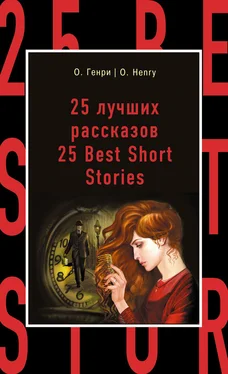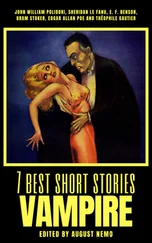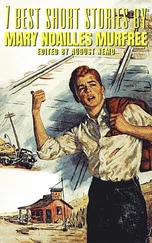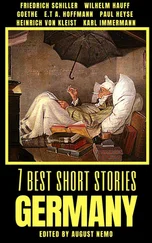When the luncheon hour drew near there came a slight lull in the uproar.
Maxwell stood by his desk with his hands full of telegrams and memoranda, with a fountain pen over his right ear and his hair hanging in disorderly strings over his forehead. His window was open, for the beloved janitress Spring had turned on a little warmth through the waking registers of the earth.
And through the window came a wandering – perhaps a lost – odour – a delicate, sweet odour of lilac that fixed the broker for a moment immovable. For this odour belonged to Miss Leslie; it was her own, and hers only.
The odour brought her vividly, almost tangibly before him. The world of finance dwindled suddenly to a speck. And she was in the next room – twenty steps away.
“By George, I’ll do it now,” said Maxwell, half aloud. “I’ll ask her now. I wonder I didn’t do it long ago.”
He dashed into the inner office with the haste of a short trying to cover. He charged upon the desk of the stenographer.
She looked up at him with a smile. A soft pink crept over her cheek, and her eyes were kind and frank. Maxwell leaned one elbow on her desk. He still clutched fluttering papers with both hands and the pen was above his ear.
“Miss Leslie,” he began hurriedly, “I have but a moment to spare. I want to say something in that moment. Will you be my wife? I haven’t had time to make love to you in the ordinary way, but I really do love you. Talk quick, please – those fellows are clubbing the stuffing out of Union Pacific.”
“Oh, what are you talking about?” exclaimed the young lady. She rose to her feet and gazed upon him, round-eyed.
“Don’t you understand?” said Maxwell, restively. “I want you to marry me. I love you, Miss Leslie. I wanted to tell you, and I snatched a minute when things had slackened up a bit. They’re calling me for the ‘phone now. Tell ’em to wait a minute, Pitcher. Won’t you, Miss Leslie?”
The stenographer acted very queerly. At first she seemed overcome with amazement; then tears flowed from her wondering eyes; and then she smiled sunnily through them, and one of her arms slid tenderly about the broker’s neck.
“I know now,” she said, softly. “It’s this old business that has driven everything else out of your head for the time. I was frightened at first. Don’t you remember, Harvey? We were married last evening at 8 o’clock in the Little Church Around the Corner.”
We are to consider the shade known as purple. It is a color justly in repute among the sons and daughters of man. Emperors claim it for their especial dye. Good fellows everywhere seek to bring their noses to the genial hue that follows the commingling of the red and blue. We say of princes that they are born to the purple; and no doubt they are, for the colic tinges their faces with the royal tint equally with the snub-nosed countenance of a woodchopper’s brat. All women love it – when it is the fashion.
And now purple is being worn. You notice it on the streets. Of course other colors are quite stylish as well – in fact, I saw a lovely thing the other day in olive green albatross, with a triple-lapped flounce skirt trimmed with insert squares of silk, and a draped fichu of lace opening over a shirred vest and double puff sleeves with a lace band holding two gathered frills – but you see lots of purple too. Oh, yes, you do; just take a walk down Twenty-third street any afternoon.
Therefore Maida – the girl with the big brown eyes and cinnamon-colored hair in the Bee-Hive Store – said to Grace – the girl with the rhinestone brooch and peppermint-pepsin flavor to her speech – “I’m going to have a purple dress – a tailor-made purple dress – for Thanksgiving.”
“Oh, are you,” said Grace, putting away some 7½ gloves into the 6¾ box. “Well, it’s me for red. You see more red on Fifth avenue. And the men all seem to like it.”
“I like purple best,” said Maida. “And old Schlegel has promised to make it for $8. It’s going to be lovely. I’m going to have a plaited skirt and a blouse coat trimmed with a band of galloon under a white cloth collar with two rows of – ”
“Sly boots!” said Grace with an educated wink.
“ – soutache [209]braid over a surpliced [210]white vest; and a plaited basque [211]and –”
“Sly boots – sly boots!” repeated Grace.
“–plaited gigot sleeves with a drawn velvet ribbon over an inside cuff. What do you mean by saying that?”
“You think Mr. Ramsay likes purple. I heard him say yesterday he thought some of the dark shades of red were stunning.”
“I don’t care,” said Maida. “I prefer purple, and them that don’t like it can just take the other side of the street.”
Which suggests the thought that after all, the followers of purple may be subject to slight delusions. Danger is near when a maiden thinks she can wear purple regardless of complexions and opinions; and when Emperors think their purple robes will wear forever.
Maida had saved $18 after eight months of economy; and this had bought the goods for the purple dress and paid Schlegel $4 on the making of it. On the day before Thanksgiving she would have just enough to pay the remaining $4. And then for a holiday in a new dress – can earth offer anything more enchanting?
Old Bachman, the proprietor of the Bee-Hive Store, always gave a Thanksgiving dinner to his employees. On every one of the subsequent 364 days, excusing Sundays, he would remind them of the joys of the past banquet and the hopes of the coming ones, thus inciting them to increased enthusiasm in work. The dinner was given in the store on one of the long tables in the middle of the room. They tacked wrapping paper over the front windows; and the turkeys and other good things were brought in the back way from the restaurant on the corner. You will perceive that the Bee-Hive was not a fashionable department store, with escalators and pompadours [212]. It was almost small enough to be called an emporium; and you could actually go in there and get waited on and walk out again. And always at the Thanksgiving dinners Mr. Ramsay –
Oh, bother! I should have mentioned Mr. Ramsay first of all. He is more important than purple or green, or even the red cranberry sauce.
Mr. Ramsay was the head clerk; and as far as I am concerned I am for him. He never pinched the girls’ arms when he passed them in dark corners of the store; and when he told them stories when business was dull and the girls giggled and said: “Oh, pshaw!” it wasn’t G. Bernard they meant at all. Besides being a gentleman, Mr. Ramsay was queer and original in other ways. He was a health crank, and believed that people should never eat anything that was good for them. He was violently opposed to anybody being comfortable, and coming in out of snow storms, or wearing overshoes, or taking medicine, or coddling themselves in any way. Every one of the ten girls in the store had little pork-chop-and-fried-onion dreams every night of becoming Mrs. Ramsay. For, next year old Bachman was going to take him in for a partner. And each one of them knew that if she should catch him she would knock those cranky health notions of his sky high before the wedding cake indigestion was over.
Mr. Ramsay was master of ceremonies at the dinners. Always they had two Italians in to play a violin and harp and had a little dance in the store.
And here were two dresses being conceived to charm Ramsay – one purple and the other red. Of course, the other eight girls were going to have dresses too, but they didn’t count. Very likely they’d wear some shirt-waist-and-black-skirt-affairs – nothing as resplendent as purple or red.
Grace had saved her money, too. She was going to buy her dress ready-made. Oh, what’s the use of bothering with a tailor – when you’ve got a figger it’s easy to get a fit – the ready-made are intended for a perfect figger – except I have to have ’em all taken in at the waist – the average figger is so large waisted.
Читать дальше
Конец ознакомительного отрывка
Купить книгу

![Коллектив авторов - Best Short Stories [С англо-русским словарем]](/books/26635/kollektiv-avtorov-best-short-stories-s-anglo-thumb.webp)










